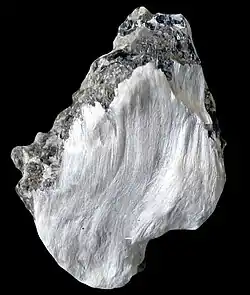石綿
Chinese
| rock; stone; 10 pecks | cotton; incessant; soft cotton; incessant; soft; downy | ||
|---|---|---|---|
| trad. (石綿) | 石 | 綿 | |
| simp. (石绵) | 石 | 绵 | |
Pronunciation
Japanese
Etymology 1

| Kanji in this term | |
|---|---|
| 石 | 綿 |
| いし Grade: 1 |
わた Grade: 5 |
| kun’yomi | |
Compound of 石 (ishi, “stone”) + 綿 (wata, “cotton, batting”).[1]
The first appearance of this term is unknown. The material was known in Japan at least as early as 1764, when Rangaku scholar Hiraga Gennai had asbestos cloth created based on Chinese techniques. However, he called this cloth 火浣布 (kakanpu, literally “fire + wash + cloth”).[1]
Usage notes
When used as a standalone noun, the ishiwata reading appears to be more common.
When used in compounds, the sekimen reading appears to be more common.
Synonyms
- アスベスト (asubesuto)
- (dated) 石絨 (sekijū)
- (dated) 温石棉 (onjakumen)
Etymology 2
| Kanji in this term | |
|---|---|
| 石 | 綿 |
| せき Grade: 1 |
めん Grade: 5 |
| on’yomi | |
May be a borrowing from Middle Chinese compound 石綿/石绵 (dzyek miɛn, literally “stone + wool, cotton”). Compare modern Cantonese 石棉 (sek6 min4). (Can this(+) etymology be sourced?)
Alternatively, may have been coined in Japan as a wasei kango (和製漢語) from Middle Chinese-derived elements as a compound of 石 (seki, “stone”) + 綿 (men, “cotton, batting”).
Usage notes
When used as a standalone noun, the ishiwata reading appears to be more common.
When used in compounds, the sekimen reading appears to be more common.
Synonyms
- アスベスト (asubesuto)
- 石絨 (sekijū)
- 温石棉 (onjakumen)
Derived terms
References
- Shōgaku Tosho (1988) 国語大辞典(新装版) [Unabridged Dictionary of Japanese (Revised Edition)] (in Japanese), Tōkyō: Shogakukan, →ISBN
- Matsumura, Akira, editor (2006), 大辞林 [Daijirin] (in Japanese), Third edition, Tōkyō: Sanseidō, →ISBN